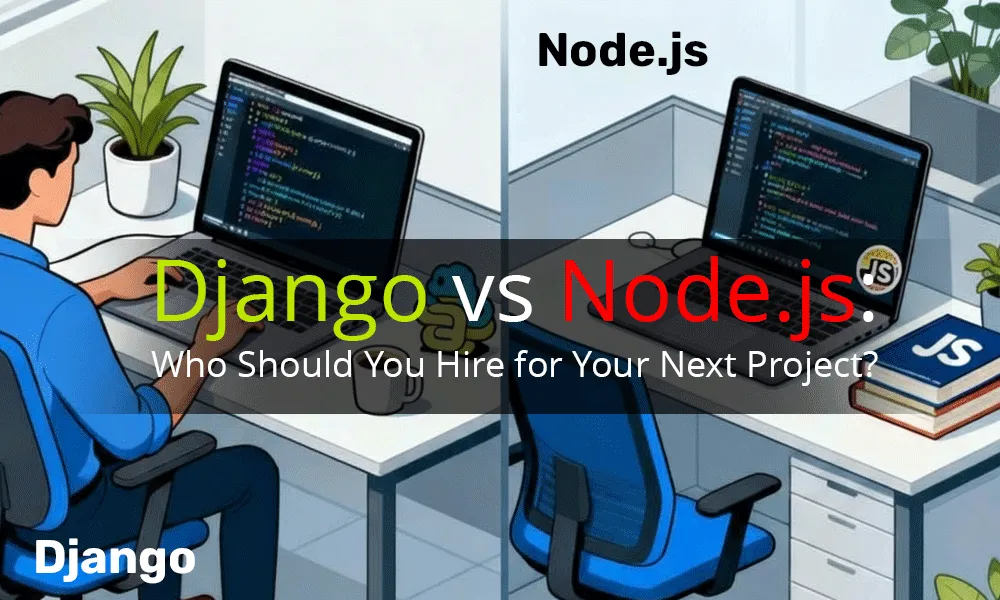There comes a time in a founder’s life when they are at a crossroads, wondering, “What must I do: hire a Django developer or hire a Node.js developer?” It’s a conundrum powerful enough to keep one up at night. Not if we can help. And we intend to start with a metaphorical view of both Django and Node.js.
1. The Battle of Philosophies
Django, for all practical reasons, is that stiff-collared academician you meet in highfalutin academic circles. Django believes in rules. Django believes in structure. And Django believes in doing things the right way and right way only. Nothing describes Django better than how our own Sr. Django developer likes to think of it: Django is a full kitchen with compartments and appliances packed in. Admin dashboard. ORM. Authentication. It’s a full house of features. But methodical.
Node.js lies on the other end of the spectrum. It’s your hoodie-wearing, device-toting, coffee-mug chugging full-stack Wizkid. It’s powered by the ever-dependable JavaScript and that means Node.js revels in flexibility.
Long story short: If you are a stickler for order, Django is your Grand Moff (Star Wars, anyone?). And if you dig asynchronous APIs and have a thing for real-time craziness, Node.js should be your muse.
2. What Are You Building? Let’s Talk Use-Cases
Discussions on the “ideal” framework are fruitless. What matters is what’s best for your use-case.
2.1. When Should You Hire a Django Developer?
- You’re building a content-heavy platform: Think CMS, education portals, internal tools, healthcare apps.
- Security is non-negotiable: Django has solid defaults. CSRF, XSS, SQLi protections? It’s baked in.
- You want rapid development with less glue-code: Django’s ecosystem handles the plumbing so your devs can focus on the logic.
- You already use Python elsewhere (e.g., AI/ML): One language to rule them all.
In case you didn’t know, Instagram and Pinterest were powered by Django in the early days.
2.2. When Should You Hire a Node.js Developer?
- You’re building real-time applications: Chat apps, collaborative tools, WebSockets galore.
- Your frontend is already in JavaScript: One language across the stack makes dev handoff smoother.
- You’re going microservices or serverless: Node’s lightweight, fast, and scalable like a squirrel on espresso.
- You care about performance under load: For I/O-heavy operations, Node can shine.
Note: Netflix, Trello, and Uber relied on Node.js for their endeavors.
3. Cost, Speed, Maintenance: The Unholy Trinity?

You want cheap. You want fast. You want scalable. Choose two.
| Factor | Django | Node.js |
|---|---|---|
| Development Speed | High (thanks to built-in tools) | Moderate (more setup required) |
| Learning Curve | Moderate (if you know Python) | Steeper (JS async quirks) |
| Community Support | Mature, opinionated | Vast, fragmented but vibrant |
| Maintenance | Easy to maintain if well-structured | Can get messy without discipline |
| Cost to Hire | Slightly higher (due to Python demand) but affordable if you hire remote developers | Competitive, especially offshore |
4. Hiring Developers in The New Age
It would be a crime not to talk about a remote staff of developers in this piece because offshore staffing is THE ‘thing’, right? COVID-19 came like the breath of Satan and left a huge scar on the world. But, as Mr. Philosopher likes to surmise, there’s always a silver lining to every tragedy, every disaster. And so, COVID-19 left us with remote work. People had to work from home during the pandemic because of social distancing. There was no escaping that! But it was proven hands down that the model was a worthy alternative to in-office work. Once the pandemic was gone, it became abundantly clear that remote work would eventually replace in-office work, at least partly. And it has stayed, quietly becoming a permanent fixture across the board.
Remote developers are a trusted talent pool now. From big tech companies to fledgling AI startups, everyone relies on them for fast and superlative coding. And the best part is that they are an organized lot, not just freelancers working multiple gigs. Staff augmentation companies like us—Remote Resource® –have made sure that their partners get supervised, timely, and high-quality service when they hire remote developers. And the array of services provided by remote staff service providers spans the whole spectrum. We’re talking AI/ML, workflow automation, IT services, non-IT services like content creation and marketing, social media optimization, digital marketing—phew, that list is long!
So, what can you expect when you hire Django developers or Node.js developers in the remote staff model?
4.1. Remote Django Developer
Right off the bat, you’ll find raw Django talent in places like India, the Philippines, and other developing countries where the education system is generally very strong and English takes precedence as the chief learning medium.
Most remote Django developers are Python generalists, meaning they can pivot into automation, data analytics, and even AI/ML if the need arises. A structured environment is their natural habitat. So, you just need to give them the specs, and they’ll return you production-grade code. Hiring costs are the icing on the cake. When you hire via remote staffing agencies, you can save as much as 50%, and sometimes even more, on your operational costs. Plus, you are not weighed down by perks, insurance, and other standard overheads. Scaling up or down remains your prerogative. No one’s going to stop you from scaling saying, “You can’t downsize!” or ‘Oh, upsizing will cost you too much,” and such. You like the sound of it, don’t you?
4.2. Remote Node.js Developer
Read section 4.1 and just add the following to it:
- Node.js talent is abundant in countries like India, and tapped into via remote staff service providers.
- They are generally wild, hungry, and pivot in a jiffy.
- Agile teams and startups are their favorite habitat.
You get the drift, right?
5. What to Look for In Your Django or Node.js Talent?

5.1. Your ideal Django developer will have these as their forte –
- Strong foundation in Python and its ecosystem (e.g., virtual environments, pip, modules)
- In-depth knowledge of Django architecture and conventions (ORM, middleware, signals, Django REST Framework)
- Experience implementing security best practices (CSRF protection, input validation, authentication workflows)
- Proficiency in data modeling and designing relational schemas that scale
- Ability to build and maintain RESTful APIs (GraphQL knowledge is a plus)
- Familiarity with databases, especially PostgreSQL, and experience with migrations and query optimization
- Experience deploying Django apps using Docker, Heroku, or CI/CD pipelines
- Clear, maintainable code with thorough documentation and version control discipline
- Bonus: Background in automation, scripting, or AI/ML using Python
5.2. Your favorite Node.js developer will brandish the following—
- Deep understanding of modern JavaScript (ES6+) and asynchronous programming concepts (callbacks, promises, async/await)
- Familiarity with the Node.js core library and npm ecosystem
- Experience building APIs with Express.js (or frameworks like Hapi, Koa, NestJS)
- Ability to write non-blocking, performant backend code under real-time demands
- Knowledge of common security vulnerabilities and protection strategies (JWT, OAuth, rate limiting, input sanitization)
- Proficiency with development tools like Babel, Webpack, ESLint, and ideally TypeScript
- Practice with writing and maintaining unit, integration, and end-to-end tests using tools like Jest or Mocha
- Experience working in microservices architecture or serverless environments
- Awareness of frontend technologies and integration needs (React, Vue, or similar)
6. Wrapping It Up…
If you are here, we hope we have been able to enlighten you…a bit, at least. But believe us when we say, the future of your development project depends on your talent source. You can walk the traditional route and stick only with local hires. And we encourage you to explore that route. But the smart thing in the current scheme of things would be to at least test out a remote staff of developers. It’ll save you a lot of hassles and let you focus on the core areas of your business.
Befuddled still? Why don’t you drop us a line and have a chat?



